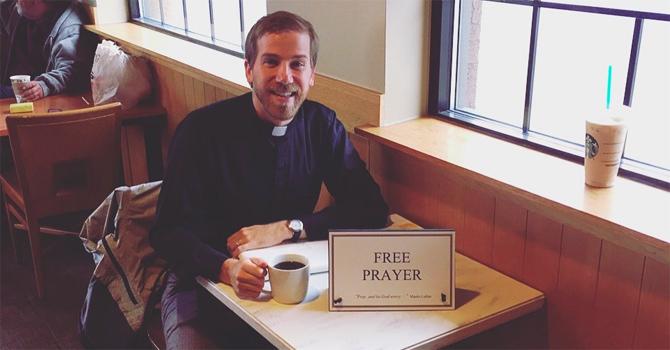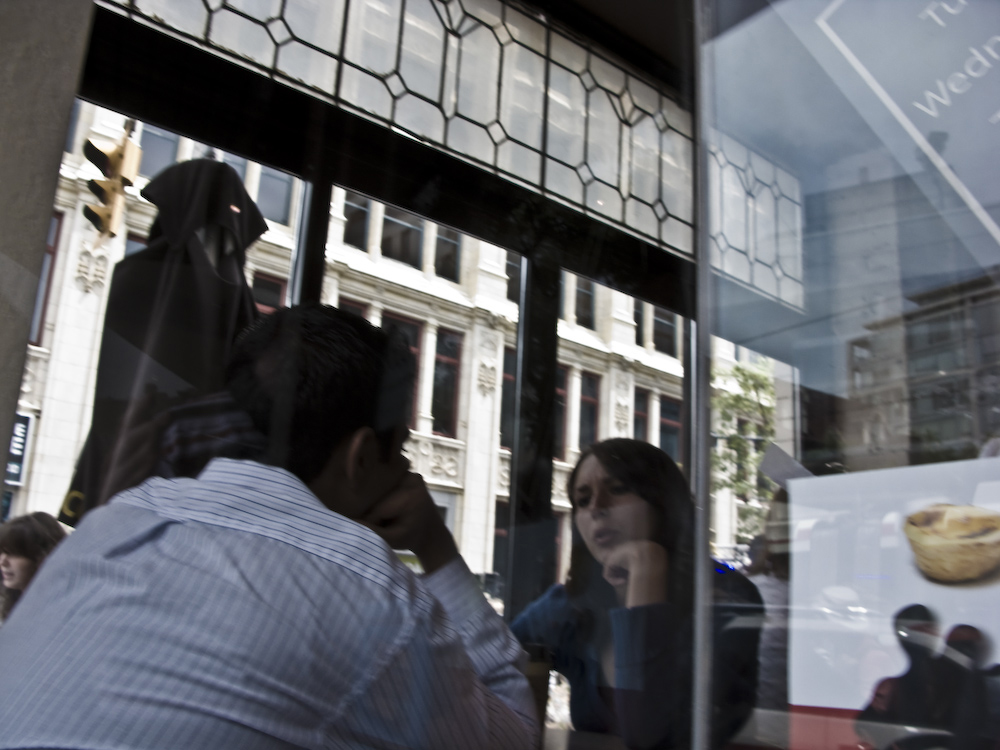Pushing the church and its ministry beyond its four walls requires overcoming the fear and uncertainty that usually block the way, Thomas Rusert says.
Rusert, a Lutheran pastor in Doylestown, Pa., learned that lesson last summer when he began making himself available for prayer and conversations in local coffee shops. He was so shy when he started out that he practically hid in out-of-the-way booths were it was difficult to see the “Free Prayer” signs he had propped up on the table.

Thomas Rusert waits for coffee shop patrons to take up his offer for free prayer. (Photo/courtesy of Thomas Rusert)
Now, Rusert’s ministry is making steady headlines and he is shipping hundreds of his “Free Prayer” cards to inspired fans around the nation and the world.
“It’s getting out there and trusting that God will back us up when we put ourselves out there,” Rusert said.
On Thursday, Rusert’s growing “free prayer community” landed him as the featured guest on a conference call of Baptist and other ministers interested in marketplace ministry. He was asked if people actually sit down and pray with him.
“Every time I go out, someone stops by,” Rusert said during the FaithSoaring Churches Learning Community’s dialogue session.
“One out of three will sit down and say ‘I could really use some prayer,’” he said. Others are intrigued, wrestling with decisions, questions, burdens or some heavy thought.
“It’s definitely a listen-first ministry.”
Marketplace ministry
It’s also the kind of ministry that a growing number of churches need – and are clamoring for, said George Bullard, president of the Columbia Partnership and organizer of Thursday’s call titled “Free Prayer: A Case Study of Marketplace Ministry.”
“I’m always looking for something that churches can do in the marketplace – to get them out of the building,” he said.
Rusert’s ministry is an example of marketplace ministry because it exists out of a church building in public, social settings where Americans actually do their living.
Panera Bread and Starbucks are examples of what experts call “third places” – because they rank in importance right between the two most important places — home and work, Bullard said, adding that churches are no longer considered in the top-three locations for most Americans.
“I would define marketplace ministry as meeting people in public or work settings verses them coming to church or some formal event,” Bullard said. “It’s connecting with them where they are, physically, as opposed to where you are, physically.”
Rusert’s free-prayer movement is a companion to chaplaincy, which meets a foundational need by showing personal concern, Bullard said.
“He’s like an itinerant chaplain. He sits down and prays for their needs.”
Churches sometimes get caught up on making non-traditional outreach overly complicated. The idea behind inviting Rusert was to show that reaching into the marketplace can be as simple as putting up a sign in a coffee shop or other public venue, Bullard said.
“A lot of people just need to get over the hump,” he said. “They don’t do much of anything in the marketplace – they are nervous.”
Heavy on persistence
That nervousness will dissipate as soon as the first person sits down to pray with you, Rusert said during the conference call.
It happened for him when the Hindu owner of a store approached his table one day – and asked Rusert to pray for the store.
Gone was the hesitancy and self-consciousness and the worry of what people would think of him.
“I felt overwhelmingly affirmed,” he said.
Rusert said he came up with the not so much out of his own creativity, but from following good advice from mentors and speakers he has heard over the years.
One suggested that to be effective, a minister must spend at least half his time outside the church building, which includes hospital visits and other church duties. Another suggested treating non-church members as if they were members.
Finally, he heard of a campus ministry that placed a couch in the middle of campus and invited students to tell their stories.
That led him to ask: how could he do a version of that in Doylestown, where he serves? His free-prayer idea emerged.
“It’s pretty light on brilliance but heavy on persistence,” Rusert said.
Now, Rusert said he’s fielding a lot of inquiries from people interested in offering free prayer in their towns. He has created a web site, 1freeprayer.org, and created a Facebook page for the growing community.
He said it’s dawning on people why coffee houses are a good place to meet those in need of prayer.
“They have a reason to go to coffee shop,” he said, whether it’s for coffee or a break from work. “Most of them don’t have a reason to walk into a church.”




